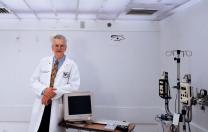One of Sigmund Freud’s great complaints about his mistreatment in life was that although he won a literary award for his famous book The Interpretation of Dreams (1900), it never received a scientific award. A century later, his peers’ judgment has been vindicated. Freud’s unscientific theory of dreamsbased on self-analysis and a cherry-picked group of clinical anecdoteshas been demolished by the discoveries of sleep medicine. “I came into the field so far post-Freudian that Freud felt like someone with a goofy theory two centuries back,” says Robert Stickgold, associate professor of psychiatry, who has studied dreams in sleep studies for years, often in collaboration with professor of psychiatry J. Allan Hobson. “The Greeks tried to explain thunder and lightning by creating gods; Freud tried to explain dreams by creating demons like the id and repressed desires,” says Stickgold. “In general, Freud’s dream theories have been remarkably resistant to scientific confirmation. He made a lot of observations that are quite prescient, but his attempt to build a model to explain them is completely wrong and there is no piece of it that holds up.”
|
For example, Freud thought we dream to keep ourselves from being awakened. “That’s absolutely false,” says Stickgold. “Freud thought that as we sleep, with constraints on the id reduced, all these nasty Victorian desires well up, and if they were allowed to come into the conscious mind, they would be so distressing that the sleeper would wake up. So dreaming is all about disguising and transforming these desires to make them more acceptable to the conscious mind. Freud probably was assuming that people dream one or two times a night, for a few minutesmost people think that, since that’s what we remember on waking. But since the 1960s, it’s been clear that we dream most of the nightsix hours out of eight hours of sleep. During the Rapid Eye Movement (REM) phases of sleep, which make up 15 to 20 percent of sleep time, we do have our most intense dreaming activity, but we dream in other sleep phases, too. If dreaming is all about repressed childhood desires, does everybody have the same amount of them?”
Another core tenet of Freud’s dream theory is that a dream is the fulfillment of a wish. Stickgold reflects on this by describing a study using the game Tetris, a kind of geometrical puzzle. Subjects were taught to play the game, and in a sleep lab that night, 60 to 75 percent of them saw images from Tetris in their dreams. “Someone asked Mark Solms, a brilliant psychoanalyst who is trying to create a new field called neuropsychoanalysisan oxymoron if I ever heard oneabout the Tetris dream imagery. He said, ‘Those are probably dreams about competition and winning’in other words, wish fulfillments. But nobody dreamed about winning the game or competing!” Stickgold also wonders about a mother with a son in Iraq who has nightmares about her child being killed. “Maybe a Freudian can interpret that as wish-fulfillment,” he says. “But I would take that as perverse, and blind adherence to an outdated model. Any dream can be interpreted as wish fulfillment, but there’s no evidence that it is. In fact, there’s tons of evidence against it.”
Entering into the interpretation of dreams “gets very messy,” Stickgold says. “If I could give the same dream to 10 analysts and they all said, ‘This is about a wish for immortality,’ then I could say, ‘OK, at least they all agree on the same interpretation.’ But they can’t even do that.”








